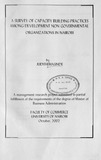| dc.description.abstract | Kenya, a country that is largely reliant on agriculture for economic growth has
st rong linkages between agriculture and industrial growth. However, the country has
sullcrcd poor development arising from experiments, lacking appropriate capacity
and competence. The government began a search for viable strategies to sustain
development and eliminate poverty, key of which are good governance and active
participation of the population, On the competitive front, there has been intense
competition since the liberalization of the market in the early I 990s. As a result
many Kenyan firms have recognized the need to monitor environmental changes as
a means of gaining competitive advantage.
In the country, Non Governmental Organizations (NGOs) have been key partners to
governmental initiatives in economic development. In the I 990s, NGOs were the
preferred including channel (or donors supporting civic development projects.
However, changes in the environment have seen Donor demands shifting from
elemental transparency and the liability 10 account for funds, to justification on
organizational essence, reach, impact and sustainability of operations. Finding
themselves in an environment of rising cost o( operations and new competition from
the private sector, NGOs have been pushed to examine new ways of survival and
decreasing their dependence on donor funds. This study investigates capacity
building practices among development NGOs, with ~pecific aim of understanding
the importance of governance, management of human resources, development of
knowledge and systems and the extent of capacity building to the communities in
which these NGOs operate. The study, conducted among development NGOs in
Nairobi was conducted through personal interviews, with the guidance of a
questionnaire. It was found that Governance, Human Resource and external
relationship practices were of priority to development NGOs. Key recommendations
from this study include increased accountability and diversity of NGO boards and a
critical analysis of an NGO's internal environment as a means of sustaining
competitive advantage.Kenya, a country that is largely reliant on agriculture for economic growth has
strong linkages between agriculture and industrial growth. However, the country has
sullcrcd poor development arising from experiments, lacking appropriate capacity
and competence. The government began a search for viable strategies to sustain
development and eliminate poverty, key of which are good governance and active
participation of the population, On the competitive front, there has been intense
competition since the liberalization of the market in the early I 990s. As a result
many Kenyan firms have recognized the need to monitor environmental changes as
a means of gaining competitive advantage.
In the country, Non Governmental Organizations (NGOs) have been key partners to
governmental initiatives in economic development. In the I 990s, NGOs were the
preferred (undoing channel (or donors supporting civic development projects.
However, changes in the environment have seen Donor demands shifting from
elemental transparency and the liability 10 account for funds, to justification on
organizational essence, reach, impact and sustainability of operations. Finding
themselves in an environment of rising cost o( operations and new competition from
the private sector, NGOs have been pushed to examine new ways of survival and
decreasing their dependence on donor funds. This study investigates capacity
building practices among development NGOs, with ~specific aim of understanding
the importance of governance, management of human resources, development of
knowledge and systems and the extent of capacity building to the communities in
which these NGOs operate. The study, conducted among development NGOs in
Nairobi was conducted through personal interviews, with the guidance of a
questionnaire. It was found that Governance, Human Resource and external
relationship practices were of priority to development NGOs. Key recommendations
from this study include increased accountability and diversity of NGO boards and a
critical analysis of an NGO's internal environment as a means of sustaining
competitive advantage. | en |

